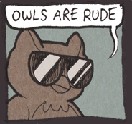STATUS
Oi, I need advice on how to to develop stories and see them through to completion.
 Seiromem
Seiromem- 08/29/2017 02:27 AM
Posts 

Pages:
1
Sooz


They told me I was mad when I said I was going to create a spidertable. Who’s laughing now!!!
5354
For the latter, the secret is to just keep going. Maybe start by just finishing little stories, or barfing out any old first draft, a la nanowrimo.
For the first bit... anything in particular you're hung up on? Stories is made of a lot of stuff.
For the first bit... anything in particular you're hung up on? Stories is made of a lot of stuff.
stuff Sooz said that seems like a good idea
The problem here is that short stories, game scripts, screenplays, novels, and such are all different enough from each other that they're not wholly related. If you're accustomed to writing novels, you're going to have trouble with short stories. Conversely, if you're accustomed to writing short stories, you're going to have trouble with novels. The same goes for video games, screenplays, and so on and so forth. They each have different structures and different rules. As such, it's probably a good idea to be versed in as many mediums as you expect you may have to write in. I love these writing teachers (I'm really not talking about you Sooz. I've heard professionals, and professors say this) who tell you that because you're inexperienced, you should write short stories until you're ready to write something bigger. This is one of the key things that shows that they really have no idea what goes into writing. Short stories are probably the hardest writing format you can tackle. Outside of poetry, they also require the most finesse and artistry. Remember, you usually have 400 pages, or an entire video game to tell your story. Short stories only let you use a few thousand words, and that goes by really fast. Before you know it, you've gone over your limit, and you're not even half done.
1. Have a plan!
It's not enough to have an idea. Know what your story's about before you put pen to paper. Know who all of your characters are. Know what they do. Know what they like. Know their favorite food. Know their favorite color. It doesn't matter that you're never going to write any of this down. Knowing these things will inform how you portray their character. Know where they come from. Know where they're going, even if your reader is never going to know these things.
2. Know your subject.
That is the subject of the story. Give your characters a goal and stick with it.
3. Speaking of characters, make sure your POV character is clearly defined.
"But my story doesn't have a specific character!" you say? Sure there are plenty of stories like this. These are usually short stories as stories without a character focus generally don't do well as novels. But there's always a point of view character. Or did you forget that somebody has to be telling the story?
4. Lay down your framework
This idea comes from the Batman: The Animated Series Writer's Bible, and it is so freaking true. Determine the structure of your story. Here, we're told that stories should be presented in three acts: act one sets the stage, act two presents the problem (for the hero; this is where we see the hero struggle), and act three presents the solution (this is where we see the hero fight and prevail). Obviously, this was their framework. Use this advice to decide which framework works best for your story. Is it a single act one shot? This is a pretty good framework for a comedy sketch.
5. Make an outline
I. Title
II. Characters
...A. Protagonist
...B. Antagonist
...C. Grumpy Cat
...D. Anyone else
III. Setting
IV. Any other thing that you think might be important.
It can't be stressed enough how useful this is. You don't even have to finish it. You just need a visual representation of your story that you can understand, predict, and follow.
6. The most important thing
None of this will matter if you don't stick with it. Keep going. Don't give up. Stay focused. That leads to.
7. Care about what you're writing
If it doesn't matter to you, why are writing it to begin with?
author=Shinan
Having an ending ready when you start also helps. That way you always know what the goal is.
Oi, this is actually really good advice.
I don't think it's the story not being seen through completion that's the problem but more like the fear of the ending, or the build-up, not being good enough, so you'll always find an excuse to put it off.
What I used to do before doing any serious writing was to make a "summary" of what my story would be - when you write down the general "foundation" of the plot, you'll find it easier to branch out and focus more on your characters' characterization instead of fretting on "what should happen next" and whatnot.
LockeZ

I'd really like to get rid of LockeZ. His play style is way too unpredictable. He's always like this too. If he ran a country, he'd just kill and imprison people at random until crime stopped.
5958
If you have trouble writing stories, you can always just make a game that doesn't have one.
Some people have trouble NOT writing stories, though. They start trying to do it even when they shouldn't, and have no idea where they're going with it. This has the same solution, but it might be harder to stomach.
Some people have trouble NOT writing stories, though. They start trying to do it even when they shouldn't, and have no idea where they're going with it. This has the same solution, but it might be harder to stomach.
Write the beginning.
Write the ending.
Write a rough outline of everything inbetween and figure it out as you go.
Write the ending.
Write a rough outline of everything inbetween and figure it out as you go.
Piano already covered it, but, really, the most important thing is having a really comprehensive outline. Know all your plot points and character arcs before starting. You can add on more details as you're working, but the core structure should already be established.
Red_Nova

Sir Redd of Novus: He who made Prayer of the Faithless that one time, and that was pretty dang rad! :D
9192
A summary is good advice. However, I want to add that planning your story and being in control of your plot are two different things. Like Sooz said, there's a lot that goes into a story, so it's difficult to give specific advice to a broad question like "how to develop a story."
Everyone's giving (good) tips on the actual act of writing. I'm gonna advise you to take a step back and look at yourself before trying to force out any more words. Figuring out the kind of writer you are will not only make the actual process of writing easier, but can help you see your story in a new light and figure out what exactly is holding you up.
Are you the type that feels more comfortable planning everything in advance? Or do you like to just write, and let your intuition take control? No matter which one you are, trying to fit into the other mold is going to come with growing pains if you aren't used to it.
What about your story? Is it driven by the actions of the main characters? Or are they merely reacting to external forces? That's the difference between a character-driven story and a plot-driven one. Trying to develop the main character(s) when you are used to using them as just a blank slate stand-in for the player to interact with the world can cause a lot of frustration.
Come up with no more than three core values you want to have as a writer. "Plot-focused," "short length," "small, but developed cast," "lots of banter," and "political & social commentary," are examples of core values you can use. These values can help you decide what you really want to say with your writing. Sure, we all have more than three values, but claiming to keep more than three at the forefront of your writing runs the risk of writing bloated and unfocused stories.
Now for the actual writing itself. Everyone's already said good things, but I want to add one more:
If your writing feels weak or if you're struggling to figure out where to go with it, there's a good chance your plot is lacking a strong enough action/reaction chain to drive events forward. Forcing the plot in a different direction just to get it to go where you want it to will come across as contrived and unnatural. Depending on the values you came up with earlier, you may find that the driving actions of your plot may need to be reworked into something you're more comfortable with.
Everyone's giving (good) tips on the actual act of writing. I'm gonna advise you to take a step back and look at yourself before trying to force out any more words. Figuring out the kind of writer you are will not only make the actual process of writing easier, but can help you see your story in a new light and figure out what exactly is holding you up.
Are you the type that feels more comfortable planning everything in advance? Or do you like to just write, and let your intuition take control? No matter which one you are, trying to fit into the other mold is going to come with growing pains if you aren't used to it.
What about your story? Is it driven by the actions of the main characters? Or are they merely reacting to external forces? That's the difference between a character-driven story and a plot-driven one. Trying to develop the main character(s) when you are used to using them as just a blank slate stand-in for the player to interact with the world can cause a lot of frustration.
Come up with no more than three core values you want to have as a writer. "Plot-focused," "short length," "small, but developed cast," "lots of banter," and "political & social commentary," are examples of core values you can use. These values can help you decide what you really want to say with your writing. Sure, we all have more than three values, but claiming to keep more than three at the forefront of your writing runs the risk of writing bloated and unfocused stories.
Now for the actual writing itself. Everyone's already said good things, but I want to add one more:
If your writing feels weak or if you're struggling to figure out where to go with it, there's a good chance your plot is lacking a strong enough action/reaction chain to drive events forward. Forcing the plot in a different direction just to get it to go where you want it to will come across as contrived and unnatural. Depending on the values you came up with earlier, you may find that the driving actions of your plot may need to be reworked into something you're more comfortable with.
Knew I could count on RMN, thanks for the advice, especially the advice I didn't ask for (seriously, sometimes you don't know what you need to know until you've heard it.)
Sooz


They told me I was mad when I said I was going to create a spidertable. Who’s laughing now!!!
5354
author=Housekeeping
Piano already covered it, but, really, the most important thing is having a really comprehensive outline. Know all your plot points and character arcs before starting. You can add on more details as you're working, but the core structure should already be established.
TBH, this doesn't work for all writers. Like, it's def. worth a try, but my experience has been that I'm much, much better off writing by the seat of my pants than trying to micromanage everything in advance. (Possibly because I'm really character-focused, so it's more comfortable to improvise with them.)
If you're interested in reading about writing, Story by Robert McKee is pretty solid. Just, uh, ignore his charts because they don't make any goddam sense. :/
Yeah, different writers have different processes, so if you find a particular way of writing that works for you, you should do it. I think that jumping into a story is fine, but in order to have really polished writing, I'd recommend a lot of revising. I can imagine that otherwise you could end up with a lot of fat in your writing.
Sooz


They told me I was mad when I said I was going to create a spidertable. Who’s laughing now!!!
5354
Yeah, I usually have a vague outline: "This is where I want to end up, these are the important plot beats, and I need to make sure there's rising action," I just sort of let the characters do their thing and figure out how to prod them in the right direction. (And excise the bits that aren't important, though usually I don't end up writing those in the first place because I tend to get stuck on those scenes.)
I tried for a long time to actually plan each part of the plot and found that this led to me getting nowhere because I'd never actually start writing. :(
I tried for a long time to actually plan each part of the plot and found that this led to me getting nowhere because I'd never actually start writing. :(
Pages:
1



















